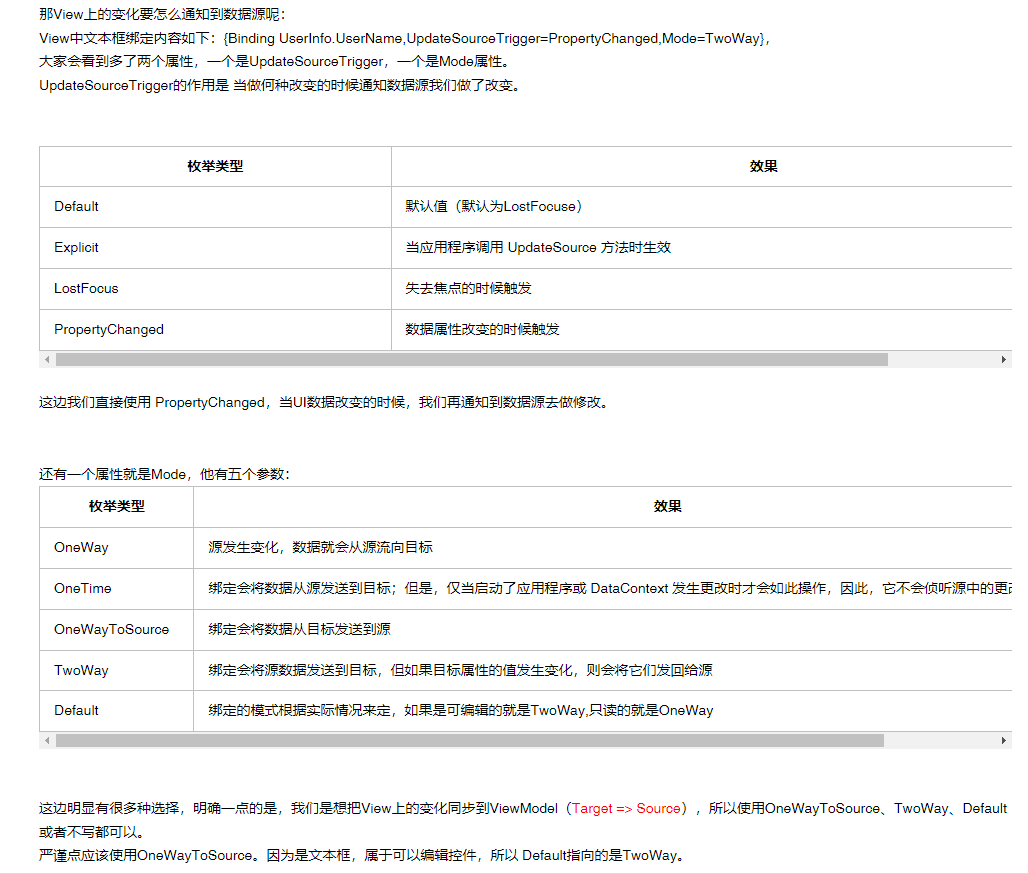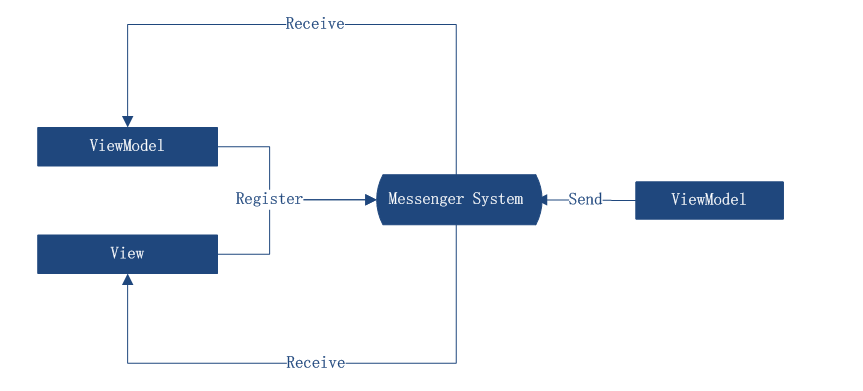WPF使用MVVMLight学习入门
参考文档
共四篇入门介绍 MvvmLight框架使用入门(一) - 楼上那个蜀黍 - 博客园 (cnblogs.com)
官方使用文档 Introduction to the MVVM Toolkit - Windows Community Toolkit | Microsoft Docs
DLL介绍
- Microsoft.Toolkit.Mvvm.ComponentModel
- ObservableObject 该类实现了INotifyPropertyChanged接口,定义了一个可通知的对象基类,供ViewModelBase继承 摘要: 一个对象的基类,其属性必须是可观察的
- ObservableRecipient 可观察对象的基类,它也充当消息的接收者 这个类是ObservableObject的扩展,它也提供了使用Microsoft.Toolkit.Mvvm.Messaging.IMessenger类型的内置支持。
- 是一个基类,实现了INotifyDataErrorInfo接口,为验证向其他应用程序模块公开的属性提供了支持。 它也继承了ObservableObject,所以它也实现了INotifyPropertyChanged和INotifyPropertyChanging。 它可以作为所有需要支持属性更改通知和属性验证的对象的起点
- Microsoft.Toolkit.Mvvm.DependencyInjection
- Ioc一种便于系统使用的类型。 IServiceProvider类型。 ioc提供了在单例、线程安全的服务提供者实例中配置服务的能力,然后可以使用该实例来解析服务实例。 使用此特性的第一步是声明一些服务
- Microsoft.Toolkit.Mvvm.Input
- RelayCommand 一种命令,其唯一目的是通过调用委托将其功能传递给其他对象;RelayCommand.CanExecute(System.Object)方法的默认返回值为true。 这种类型不允许你在.Execute(System.Object)和CanExecute(System.Object)回调方法中接受命令参数
- RelayCommand<T>
- AsyncRelayCommand
- AsyncRelayCommand<T>
- IRelayCommand
- IRelayCommand<in T>
- IAsyncRelayCommand
- IAsyncRelayCommand<in T>
- Microsoft.Toolkit.Mvvm.Messaging
- IMessenger 提供在不同对象之间交换消息能力的类型的接口 , 还可以将消息发送到由令牌唯一标识的特定通道,并在应用程序的不同部分中使用不同的信使
- WeakReferenceMessenger
- 消息接口的实现 备注:imessenger实现使用弱引用来跟踪已注册的收件人,所以当不再需要收件人时,
- 不需要手动注销他们该类型将自动执行内部调整时完整GC调用集合,所以手动调用Cleanup没有必要确保平均内部数据结构尽可能的削减和紧凑。 注意:在。net Framework中运行时,由于应用程序域卸载问题,不支持此功能。
- StrongReferenceMessenger
- 消息接口的实现 备注:imessenger实现使用强引用来跟踪已注册的收件人,所以当他们不再需要时,必须手动注销他们。
- IRecipient<TMessage> 用于声明特定消息类型注册的接收方的接口。
- MessageHandler<TRecipient, TMessage>
- Microsoft.Toolkit.Mvvm.Messaging.Messages
- PropertyChangedMessage<T> 用于广播可观察对象属性更改的消息
- RequestMessage<T>
- AsyncRequestMessage<T>
- CollectionRequestMessage<T>
- AsyncCollectionRequestMessage<T> 用于接收多个响应的请求消息的类,这些响应可以直接使用,也可以通过派生类使用
- ValueChangedMessage<T> 一种基消息,每当特定值发生更改时发出信号;类型参数:改变的值的类型
MVVM简单使用方法
安装包

添加视图模型
public class MainWindowViewModel : ObservableObject { private string title; public string Title { get { return title; } set { SetProperty(ref title, value); } } public ICommand ChangeTitleCommand { get; set; } private void ChangeTitle() { Title = "Hello MvvmLight"; } public MainWindowViewModel() { Title = "Hello World"; ChangeTitleCommand = new RelayCommand(ChangeTitle); } }
添加视图模型Locator
public class ViewModelLocator { /// <summary> /// Gets the <see cref="IServiceProvider"/> instance to resolve application services. /// </summary> internal static IServiceProvider Services { get; private set; } public ViewModelLocator() { ConfigureServices(); } /// <summary> /// Configures the services for the application. /// </summary> private static IServiceProvider ConfigureServices() { var services = new ServiceCollection(); services.AddSingleton<MainWindowViewModel>(); Services = services.BuildServiceProvider(); Ioc.Default.ConfigureServices(Services); return Services; } public MainWindowViewModel MainVM=> Services.GetService<MainWindowViewModel>(); }
XAML配置

主窗体xaml
<Window.DataContext> <Binding Path="MainVM" Source="{StaticResource Locator}"/> </Window.DataContext> <Grid> <Grid.RowDefinitions> <RowDefinition Height="*"></RowDefinition> <RowDefinition Height="*"></RowDefinition> </Grid.RowDefinitions> <TextBlock Height="50" Text="{Binding Title}"></TextBlock> <Button Height="50" Grid.Row="1" Command="{Binding ChangeTitleCommand}"></Button> </Grid>
数据绑定的一个备注 利刃 MVVMLight 4:绑定和绑定的各种使用场景 - Hello-Brand - 博客园 (cnblogs.com)

值验证ObservableValidator
//参考链接 https://www.cnblogs.com/AtTheMoment/p/15676984.html public class NumberAttribute : ValidationAttribute { public NumberAttribute() { } public override string FormatErrorMessage(string name) { return base.FormatErrorMessage(name); } protected override ValidationResult IsValid(object value, ValidationContext validationContext) { if (value == null || string.IsNullOrWhiteSpace(value.ToString())) return new("内容为空!"); if (!int.TryParse(value.ToString(), out var number)) return new("年龄非法"); else if (number <= 0 || number > 100) return new($"{number}是非法年龄"); return ValidationResult.Success; } } public class ValidatorVM : ObservableValidator { private string name; [Required(AllowEmptyStrings =false,ErrorMessage ="名字不可为空")] [MaxLength(6,ErrorMessage ="长度不能大于6")] public string Name { get { return name; } set { SetProperty(ref name, value, true); } } private int age; [Number] public int Age { get { return age;} set { SetProperty(ref age, value, true); } } }
前台代码
<TextBox Height="50" Text="{Binding VM.Age}"> <TextBox.Style> <Style> <Setter Property="Validation.ErrorTemplate"> <Setter.Value> <ControlTemplate> <StackPanel> <AdornedElementPlaceholder/> <ItemsControl ItemsSource="{Binding}"> <ItemsControl.ItemTemplate> <DataTemplate> <TextBlock Foreground="Red" Text="{Binding ErrorContent}"/> </DataTemplate> </ItemsControl.ItemTemplate> </ItemsControl> </StackPanel> </ControlTemplate> </Setter.Value> </Setter> </Style> </TextBox.Style> </TextBox>
或者参考 https://www.cnblogs.com/wzh2010/p/6518834.html
命令绑定修改为
ChangeTitleCommand = new RelayCommand(ChangeTitle, CanExecute);
private bool CanExecute() { return !VM.HasErrors; }
完整的模型代码如下
public class MainWindowViewModel : ObservableObject { private string title; public string Title { get { return title; } set { SetProperty(ref title, value); } } public ICommand ChangeTitleCommand { get; set; } private ValidatorVM _VM; public ValidatorVM VM { get { return _VM; } set { _VM = value; } } private void ChangeTitle() { Title = "Hello MvvmLight"; } public MainWindowViewModel(IServiceProvider service) { _VM = service.GetRequiredService<ValidatorVM>(); Title = "Hello World"; //ChangeTitleCommand = new RelayCommand(ChangeTitle); ChangeTitleCommand = new RelayCommand(ChangeTitle, CanExecute); } private bool CanExecute() { return !VM.HasErrors; } }
带参数命令
RelayCommand = new RelayCommand<string>(obj => Title = "带参数的命令" + obj);
将参数包装成依赖属性,这种方式不推荐,太麻烦
/// <summary> /// 一种方式就是将 UserParam类 改成 支持具有依赖属性的对象 /// </summary> public class UserParam:FrameworkElement { public int Age { get { return (int)GetValue(AgeProperty); } set { SetValue(AgeProperty, value); } } // Using a DependencyProperty as the backing store for Age. This enables animation, styling, binding, etc... public static readonly DependencyProperty AgeProperty = DependencyProperty.Register("Age", typeof(int), typeof(UserParam), new PropertyMetadata(0, CustomProperty, CustomValidateValueCallback)); /// <summary> /// 属性值验证回调方法 /// </summary> /// <param name="d"></param> /// <param name="e"></param> private static object CustomValidateValueCallback(DependencyObject d, object baseValue) { return baseValue; } /// <summary> /// 属性值更改回调方法 /// </summary> /// <param name="d"></param> /// <param name="e"></param> private static void CustomProperty(DependencyObject d, DependencyPropertyChangedEventArgs e) { } }
绑定示例 https://www.cnblogs.com/wzh2010/p/6607702.html
<StackPanel DockPanel.Dock="Left" Width="240"> <Button Command="{Binding PassArgObjCmd}" Content="传递多个参数" Height="23" HorizontalAlignment="Left" Width="100"> <Button.CommandParameter> <model:UserParam UserName="{Binding ElementName=ArgStrFrom,Path=Text}" UserPhone="88888888" UserAdd="地址" UserSex="男" ></model:UserParam> </Button.CommandParameter> </Button> </StackPanel>
转换器传递参数
模型定义如下
/// <summary> /// 一种方式就是将 UserParam类 改成 支持具有依赖属性的对象 /// </summary> public class UserParam { public string UserName { get; internal set; } public string UserSex { get; internal set; } public string UserPhone { get; internal set; } public string UserAdd { get; internal set; } } public class UserInfoConvert : IMultiValueConverter { /// <summary> /// 对象转换 /// </summary> /// <param name="values">所绑定的源的值</param> /// <param name="targetType">目标的类型</param> /// <param name="parameter">绑定时所传递的参数</param> /// <param name="culture"><系统语言等信息</param> /// <returns></returns> public object Convert(object[] values, Type targetType, object parameter, System.Globalization.CultureInfo culture) { if (!values.Cast<string>().Any(text => string.IsNullOrEmpty(text)) && values.Count() == 4) { UserParam up = new UserParam() { UserName = values[0].ToString(), UserSex = values[1].ToString(), UserPhone = values[2].ToString(), UserAdd = values[3].ToString() }; return up; } return null; } public object[] ConvertBack(object value, Type[] targetTypes, object parameter, System.Globalization.CultureInfo culture) { throw new NotImplementedException(); } }
ViewModel中添加属性
private void ExcuteParam(UserParam obj) { userParam = obj; } public IRelayCommand<UserParam> RelayCommand { get; } private UserParam userParam; public UserParam UserParam { get { return userParam; } set { SetProperty(ref userParam, value); } }
RelayCommand = new RelayCommand<UserParam>(ExcuteParam);
前台页面代码
名称空间引入
xmlns:convert="clr-namespace:MvvmSample.Core.ViewModels"
<StackPanel Margin="10,0,0,50"> <TextBlock Text="动态参数传递" FontWeight="Bold" FontSize="12" Margin="0,5,0,5" ></TextBlock> <StackPanel Orientation="Horizontal" > <StackPanel Orientation="Vertical" Margin="0,0,10,0" > <StackPanel Orientation="Horizontal" Margin="0,0,0,5" > <TextBlock Text="姓名" Width="80" ></TextBlock> <TextBox x:Name="txtUName" Width="200" /> </StackPanel> <StackPanel Orientation="Horizontal" Margin="0,0,0,5" > <TextBlock Text="电话" Width="80" ></TextBlock> <TextBox x:Name="txtUPhone" Width="200" /> </StackPanel> <StackPanel Orientation="Horizontal" Margin="0,0,0,5" > <TextBlock Text="地址" Width="80"></TextBlock> <TextBox x:Name="txtUAdd" Width="200"/> </StackPanel> <StackPanel Orientation="Horizontal" Margin="0,0,0,5" > <TextBlock Text="性别" Width="80" ></TextBlock> <TextBox x:Name="txtUSex" Width="200" /> </StackPanel> </StackPanel> <StackPanel> <StackPanel.Resources> <convert:UserInfoConvert x:Key="uic"/> </StackPanel.Resources> <Button Content="点击传递" Command="{Binding RelayCommand}"> <Button.CommandParameter> <MultiBinding Converter="{StaticResource uic}"> <Binding ElementName="txtUName" Path="Text"/> <Binding ElementName="txtUSex" Path="Text"/> <Binding ElementName="txtUPhone" Path="Text"/> <Binding ElementName="txtUAdd" Path="Text"/> </MultiBinding> </Button.CommandParameter> </Button> </StackPanel> <StackPanel Width="240" Orientation="Vertical" Margin="10,0,0,0" > <TextBlock Text="{Binding UserParam.UserName,StringFormat='姓名:\{0\}'}" ></TextBlock> <TextBlock Text="{Binding UserParam.UserPhone,StringFormat='电话:\{0\}'}" ></TextBlock> <TextBlock Text="{Binding UserParam.UserAdd,StringFormat='地址:\{0\}'}" ></TextBlock> <TextBlock Text="{Binding UserParam.UserSex,StringFormat='性别:\{0\}'}" ></TextBlock> </StackPanel> </StackPanel> </StackPanel>
传递事件参数--拖拽上传
添加包

名称空间引用
xmlns:behav="http://schemas.microsoft.com/xaml/behaviors"
<StackPanel Margin="10,0,0,50"> <TextBlock Text="传递原事件参数" FontWeight="Bold" FontSize="12" Margin="0,5,0,5" ></TextBlock> <DockPanel x:Name="PassEventArg" > <StackPanel DockPanel.Dock="Left" Width="240" Orientation="Horizontal" > <Border BorderBrush="Red" BorderThickness="1" > <TextBlock Width="100" Height="50" Text="拖拽上传" TextAlignment="Center" FontSize="18" AllowDrop="True" > <behav:Interaction.Triggers> <behav:EventTrigger EventName="Drop"> <behav:InvokeCommandAction Command="{Binding DragCommand}" PassEventArgsToCommand="True"/> </behav:EventTrigger> </behav:Interaction.Triggers> </TextBlock> </Border> </StackPanel> <StackPanel DockPanel.Dock="Right" Width="240" Orientation="Horizontal"> <TextBlock Text="{Binding FileAdd,StringFormat='获取地址:\{0\}'}" ></TextBlock> </StackPanel> </DockPanel> </StackPanel>
后台代码
public IRelayCommand<DragEventArgs> DragCommand { get; set; } private string _FileAdd; public string FileAdd { get { return _FileAdd; } set { SetProperty(ref _FileAdd, value); } } private void ExecuteDrop(DragEventArgs obj) { FileAdd = ((System.Array)obj.Data.GetData(System.Windows.DataFormats.FileDrop)).GetValue(0).ToString(); } DragCommand = new RelayCommand<DragEventArgs>(ExecuteDrop);
控件的事件转换为命令
<StackPanel Margin="10,0,0,50"> <TextBlock Text="事件转命令执行" FontWeight="Bold" FontSize="12" Margin="0,5,0,5" ></TextBlock> <DockPanel x:Name="EventToCommand" > <StackPanel DockPanel.Dock="Left" Width="240" Orientation="Horizontal" > <ComboBox Name="combox" Width="130" ItemsSource="{Binding UserParamList}" DisplayMemberPath="UserName" SelectedValuePath="UserSex"> <behav:Interaction.Triggers> <behav:EventTrigger EventName="SelectionChanged"> <behav:InvokeCommandAction Command="{Binding SelectCommand}"/> </behav:EventTrigger> </behav:Interaction.Triggers> </ComboBox> </StackPanel> <StackPanel DockPanel.Dock="Right" Width="240" Orientation="Horizontal"> <TextBlock Text="{Binding ElementName=combox, Path=SelectedIndex}" ></TextBlock> </StackPanel> </DockPanel> </StackPanel>
后台代码
public ObservableCollection<UserParam> UserParamList { get; set; } public IRelayCommand SelectCommand { get; } private void OnSelectCommand() { }
数据初始化
UserParamList = new() { new() { UserName = "张三", UserSex = "1" }, new() { UserName = "李四", UserSex = "2" }, new() { UserName = "王五", UserSex = "3" }, new() { UserName = "赵六", UserSex = "4" }, }; SelectCommand=new RelayCommand(OnSelectCommand);
在多线程和调度中使用
异步调用不卡UI界面
public IAsyncRelayCommand AsyncRelayCommand { get; } AsyncRelayCommand = new AsyncRelayCommand(() => Task.Run(() => { Thread.Sleep(8000); Title = "我执行完了"; }));
Messenger

注册消息的简单模式
参数说明:
<string, string> 消息类型,令牌类型
this为消息的接收者实例,“AAA”为消息令牌,
MessageHandler:(sender,message)==>sender为接收消息的收件人,message接收到的消息
WeakReferenceMessenger.Default.Register<string, string>(this, "AAA", (recipient, message) => { MessageBox.Show($"MessagePage 接收到了消息: {message};\n消息的收件人类型为{recipient.GetType()};"); });
不带令牌的消息注册
WeakReferenceMessenger.Default.Register<string>(this, (recipient, message) => { if (recipient is MessagePage)//如果是发送给我的 { MessageBox.Show($"MessagePage 接收到了消息: {message};\n消息的收件人类型为{recipient.GetType()};"); } });
备注:同一收件人只能注册一种消息类型
发送字符串消息的两种形式
WeakReferenceMessenger.Default.Send( DateTime.Now.ToString("HH:mm:ss")+"发送了字符串消息"); WeakReferenceMessenger.Default.Send( DateTime.Now.ToString("HH:mm:ss") +"发送了令牌消息,标识符为AAA", "AAA");
备注:不带令牌的形式的消息不会发送给注册了令牌的接收者,带令牌的形式,不会发送给没有注册令牌的接收者
自动注册接收消息
备注:需要将isactive设置为true;以下实例将接收到所有字符串类型的消息
public class MessagePageViewModel : ObservableRecipient, IRecipient<string> { public MessagePageViewModel() { this.IsActive = true; } public void Receive(string message) { MessageBox.Show($"MessagePage 接收到了消息: {message};消息令牌为:AAA;\n消息的收件人类型为{this.GetType()};"); } }
ObservableRecipient的方法说明:发送属性改变的消息,如果想要使用自定义的令牌,可以重写该方法
protected virtual void Broadcast<T>(T oldValue, T newValue, string? propertyName)
注册接收属性改变的消息
WeakReferenceMessenger.Default.Register<PropertyChangedMessage<string>>(this, (recipient, message) => { if (recipient is MessagePage) { MessageBox.Show($"发件人: {message.Sender};属性名:{message.PropertyName}"); } });
请求消息
注册请求消息
WeakReferenceMessenger.Default.Register<RequestMessage<string>>(this, (recipient, message) => { if (recipient is MessagePage) { message.Reply("我已经接收到了你的请求消息,这是我的答复"); } });
发送请求,并接收答复
var name = WeakReferenceMessenger.Default.Send<RequestMessage<string>>();



 浙公网安备 33010602011771号
浙公网安备 33010602011771号